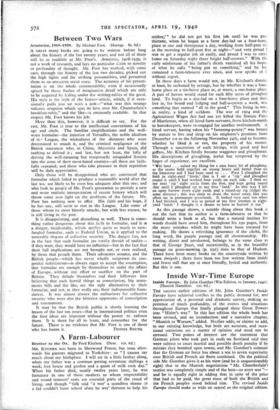Between' Two Wars
Armistice, 1918-1939. By Michael Foot. (Harrap. 8s. 6d.)
A GREAT many books are going to be written before long about the history of the last twenty years; and not all of them will be as readable as Mr. Foot's. Armistice, 1918-1939, is not a work of research, and lays no particular claim to novelty or profundity of thought. Mr. Foot has worked, with some care, through the history of the last two decades, picked out the high lights and the striking personalities, and presented them as an attractive serial story. The accuracy of his presen- tation is on the whole commendable; even if occasionally spiced by those flashes of imaginative detail which are only to be acquired by hiding under the writing-tables of the great. His style is the style of the feature-article, which, if it occa- sionally pulls you up with a jerk—" what was this strange volcanic eruption which spat its lava over Mr. Chamberlain's breakfast-table," and the like—is eminently readable. In that respect Mr. Foot knows his job.
More than this, however, it is difficult to say. For the rest, Mr. Foot is true to the intellectual conventions of his age and circle. The familiar simplifications and the well- worn formulae—the injustice of Versailles, the noble idealism of do League, the wickedness of the dictators who were determined to smash it, and the criminal negligence of the British statesmen who, in China, Abyssinia and Spain, did nothing to defend it ; and last, but not least, the folly of driving the well-meaning but temporarily misguided Soviets
into the arms of their most-hated enemies all these are faith- fully repeated; and those who take pleasure in their repetition will be duly appreciative.
Only those will be disappointed who are convinced that formulae which failed to produce a reasonable world after the last wa: are likely to be even less adequate after this one; and who look to peop:e of Mr. Foot's generation to provide a new and more realistic interpretation of recent history which will throw some new light on the problems of the future. Mr. Foot has nothing new to offer. His faith and his hope, if he has any, still seem to rest in the League. Like some of those whom he most bitterly attacks, but with less excuse, he is still living in the past.
It is disappointing, and disturbing as well. There is some- thing rather dangerous about this fa:th in formulae, and it is a danger, incidentally, which applies quite as much to new- fangled formulae, such as Federal Union, as it applied to the venerable slogans of collective security. The danger lies, not in the fact that such formulae are totally devoid of reality— if they were, they would have no influence—but in the fact that their full implications are not brought out, or even realised, by those that preach them. Their advocates assume, and the British people—which has never wholly outgrown its con- genital isolationism—is always eager to accept the assumption, that formulae are enough by themselves to order the affairs of Europe, without any effort or sacrifice on the part of Britain. They delude themselves and their followers into believing that such horrid things as conscription, big arma- ments bills and the like, are the ugly alternatives to their formulae, and not, as they really are, their indispensable foun- dation. It was almost always the enthusiasts for collective security who were also the bitterest opponents of conscription and rearmament.
It may be that the British public is slowly learning the lesson of the last ten years—that in international politics even the best ideas are impotent without the power to enforce them. It is there for all to learn, and remember for the future. There is no evidence that Mr. Foot is one of those










































 Previous page
Previous page